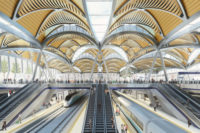Worth around $100 billion, two major rail programs now taking off in France and the U.K. are expected to create a long-term bonanza of megacontracts for European construction firms. Civil engineering jobs worth hundreds of million of dollars are mobilizing or about to be signed on France's new Grand Paris Express metro and for the U.K.'s second high-speed line, between London and Birmingham.
In France, the special-purpose state company Société du Grand Paris (SGP) last month awarded two major tunneling contracts on the new orbital Line 15 South. SGP plans to spend more than $1 billion on the program this year, says Philippe Yvin, company chairman.
The full metro plan covers some 190 kilometers of new lines, with nearly 70 stations and extensions to existing metro routes. When the work is done, 90% of Paris citizens will live within 2 km of a station, according to SGP.
By June, SGP is due to sign the final three of Line 15's eight tunneling contracts, completing procurement of the 33-km southern stretch, from Pont Sevres in the west to the Noisy-Champs station in the east, says a SGP spokesman. In total, the 75-km Line 15 will be developed in phases by 2030.
After Line 15, the next route for procurement is Line 16, which will loop around the northeastern part of the city. Totaling more than 20 km, the twin tunnels will connect Noisy-Champs and Saint-Denis Pleyel via a station serving the Le Bourget airport. The agency will begin procurement of three tunneling contracts by year's end, says the spokesman.
Line 17 secured final approval this February, and Line 18 is scheduled to be green-lighted soon. For more than 25 km, Line 18 will run from a junction with the orbital Line 15 at Saint-Denis-Pleyel in the north to Mesnil-Amelot via the Charles de Gaulle airport. The 35-km Line 18 in the southwest will connect Versailles and Paris Orly airport.
Bidding for these lines has yet to start, while preparatory construction started last June on Line 15 South. Since last September, SGP has awarded five Line 15 tunneling contracts, including two signed this February for about 15 km of twin bores between Créteil l'Échat and Fort d'Issy-Vanves-Clamart.
A Bouygues Travaux Publics-led consortium secured a $1-billion contract for stations and 6.6 km of twin tunnels between Créteil l'Écha and Villejuif Louis Aragon. Under a separate deal, a VINCI Group-led consortium will drive twin bores and build stations from Villejuif Louis Aragon to Fort d'Issy-Vanves-Clamart.
Bouygues and VINCI also are among the firms in consortiums short-listed for at least one major contract on the U.K.'s estimated $27-billion HS2 railroad's first phase, which has just secured its final approval.
With this February's completion of necessary legislation, HS2 Ltd., the company promoting the 225-km London-Birmingham railroad, plans to sign $10.5-billion worth of design-build contracts early this summer, with construction set to start a year later, according to a spokesperson.
The company last November signed three contracts, totaling $1.1 billion, for preparatory work along the route, including planting seven million trees. As physical work starts on the high-speed railroad's first phase, HS2 Ltd. recently awarded contracts to prepare for the next sections, to Manchester and Leeds. The U.K. parliament expects detailed plans to be submitted for approval in 2019. The entire $69-billion program is expected to finish in the 2030s.
CH2M secured the contract as HS2's second-phase development partner, but an unsuccessful bidder is challenging the award. Less controversially, HS2 also appointed three team of firms to undertake conceptual designs and environmental studies.
The Vinci-led LISEA consortium recently inaugurated France’s latest high-speed railroad – the 302-km segment from Tours to Bordeaux—aiming to start commercial operations this July. LISEA partially funded the $8.4-billion underline under a 50-year contract to 2061 with SNCF Réseau including a six-year design-build phase. SNCF invested another $1.3 billion on links to the existing network. Nearly 10,000 people worked on the project, which will carry 20 million passengers a year at speeds up to 320 km per hour.





